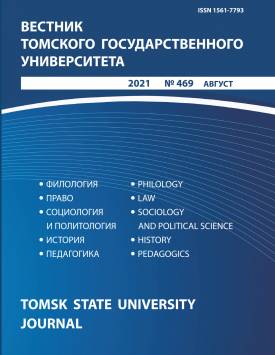Representation of the Imperial Principles of Governing the Steppe Territory in the Second Half of the 19th Century in the Notes of the General of the Infantry Ivan Babkov
The second half of the 19th century was the time when the formation of the common space of the Russian Empire, the final accession of the Eastern suburbs, the social, political, cultural integration of remote areas in the state space was completed. In the studied period, the main migration flows went from the European part of Russia to the weakly utilized agricultural lands of the Steppe Teritory, which in practice was accompanied by fundamental changes in the colonization program of the Russian state. Having solved the tasks of the military-political consolidation of the border of the Steppe Territory, the tsarist government began a systematic integration of indigenous population into the social structure of Russian society. Reconstruction of this process is productive when drawing on a wide range of sources, in particular, evidence of the direct participants of the colonization, representatives of the Russian bureaucracy, servicemen, major leaders of social movements. General of Infantry I.F. Babkov, who left memories of his service in Western Siberia and the Steppe Territory, was an expert in these areas: for many years, he was a government official and combined this work with scientific and social practices. His memoirs present the most detailed and analyzed information about the participation of the central and regional authorities in the organization of governing in the Steppe Territory during the transition period when the migration activity of the peasantry increased, and there arose the issue of taking administrative measures for the normalization of relations between the main actors of colonization in the region: Russian resettlers, indigenous peoples, and the Cossacks. The value and representativeness of Babkov's memoirs is determined by two components. Firstly, official and legal documents are often not able to convey all the nuances of the imperial policy in the Eastern outskirts, the content of the discourse of power and society, the emotional response of the bureaucracy to the process, which actualizes the importance of referring to personal testimony. Secondly, Babkov's reflections about a wide range of resettlement issues allow distinguishing the imperial component, identifying patterns of communication and decision-making in the changing geography of power.
Keywords
memoirs of Ivan Babkov, colonization, imperial governing principles, sources of personal origin, representation, Steppe TerritoryAuthors
| Name | Organization | |
| Tokmurzayev Bakyt S. | Syrdariya University | nat.proff.om@yandex.ru |
| Tazhitayeva Raya S. | Syrdariya University | nat.proff.om@yandex.ru |
| Sirbayeva Almagul A. | Syrdariya University | nat.proff.om@yandex.ru |
References

Representation of the Imperial Principles of Governing the Steppe Territory in the Second Half of the 19th Century in the Notes of the General of the Infantry Ivan Babkov | Vestnik Tomskogo gosudarstvennogo universiteta – Tomsk State University Journal. 2021. № 469. DOI: 10.17223/15617793/469/27
